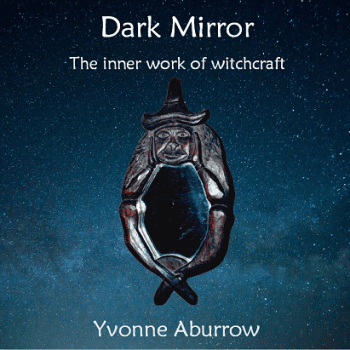Hello, beautiful creatures. Those of you who’ve made your way here after reading the previous installment in this series may note a slightly less frenetic tone in today’s entry. Some of that might be my decreased caffeine intake, but some of it is probably related to the subject matter. After all, today I’m taking on the definition of magic, which demands a modicum of gravitas and other $5 words, not to mention a Victorian waistcoat and the demeanor of an Oxford don.
[rustles papers, clears throat]
Hrm. Yes. Well. Magic. Right, then.
Magic is notoriously one of those words where, if you ask any ten practitioners, you’ll get thirteen different answers, some of them mutually exclusive, after which the respondents will start arguing about whose definitions are correct, whose are utter tosh, and whose are just reheated Crowley… and since we’re talking about both sex and magic in the context of modern Paganism and polytheism, we’re gonna have to deal with Crowley sooner or later, so let’s just go ahead and get it over with.
An Unavoidably Necessary Detour through Pre-War England
For those of you unfamiliar with the (in)famous magician, writer, and vocational bête noire Aleister Crowley… well, a full biography is beyond the scope of this column, so I encourage you to click that Wikipedia link and do some reading. Go ahead, I’ll wait. (Those of you already familiar with Uncle Al may skip to the next paragraph, and I won’t blame you a bit1.)
Welcome back! As you may have read, Crowley defined magick (with a -k at the end, thank you very much) as “the Science and Art of causing Change to occur in conformity with Will.” He would further expand on this definition as “the Science of understanding oneself and one’s conditions” and “the Art of applying that understanding in action,” suggesting that for Crowley, magic is as psychological as it is parapsychological2. Dion Fortune, the grand dame of pre-WWII English magic, modified Crowley’s definition to refer to changes “in consciousness,” amplifying the focus on the mind of the mage as a central component of their approach to magic.
So, is magic all in your head? Well, that kind of depends on what you mean. Crowley and Fortune both stressed the psychological aspects of magic, but also saw magic as a means of changing not only the consciousness of the practitioner, but reality itself. Fortune was expressly concerned with magic’s ability to affect the mundane lives of both practitioners and those around them. She discussed the implications of careless or baneful magic in her nonfiction, as in Psychic Self-Defense, and explored these themes in her fictional works, notably in The Secrets of Dr. Taverner. For his part, Crowley seems to have included both everyday, mundane actions and the more numinous acts of will under the heading of magick, suggesting a lack of distinction between the two. I don’t necessarily dispute this, but I don’t find it an especially useful definition, either. While the magical and the mundane can (and often should) be interleaved, I find it useful to make a distinction between the magical act of weaving a spell and the mundane act of making a cup of coffee.
Which is all well and good, but what is magic?
What We Talk About When We Talk About Magic
In Western culture, we spend a lot of time talking about “science” and “religion” as opposing poles along a single axis. Many people, both deeply religious and deeply areligious, find that framing to be suitable for their endorphin-rush addictions, but personally, I have a lot of trouble with it. For starters, it ignores the lengthy fraternal relationship between religion and science, past and present. It also, I think, misses the point of both. Science is ultimately about causal relationships, those we can observe and those we can infer. It can’t tell us what things mean, only how they behave. Religion is about finding or creating meaning from what we observe. It can’t model the physical universe worth a damn, but it can be a way of explaining to ourselves why we care, or why we should. Rather than being binary polar opposites, I’d suggest that religion and science operate along separate axes. We can call them x and y, if we like.
Magic is the z axis. It’s neither science nor religion, but dances between them. It’s a doing, one which connects the observable phenomena beloved by science with the myth and meaning inherent to religion. Magic has rules, but they aren’t much like the laws of physics or the tenets of faith. They’re more akin to the rules of etiquette, or of fairy tales. They have their own internal logic which, taken on their own terms, are as inevitable and unassailable as the second law of thermodynamics or the golden rule.
Okay, okay, enough poetry. For our purposes here, I define magic as changing reality in a manner not constrained by causal proximity.
That might require a little unpacking, so bear with me while I bust out a box knife and a garbage bag for all the styrofoam peanuts.
In Which We Wander Off Into a Thicket
By “causal proximity,” I’m referring to the extent to which a relationship between cause and effect is readily apparent. For instance, if I push a glass off the counter and it falls onto a slate floor, in all likelihood it’s going to shatter. There’s a simple relationship between cause (I push the glass off the counter) and effect (the glass shatters). In other words, the cause is visibly close—in proximity—to the effect. On the other hand, if a friend across the country tells me they’ve lost an item and I divine its location correctly, there’s not an easily-defined cause/effect relationship at work.
At this point, we’ve left the world of straightforward physics and entered a discursive realm where we’re talking about things like healing, remote viewing, clairaudience, prognostication, psychokinesis, the structure of the cosmos, the existence of intelligences other than human, angels, demons, spirits, gods, and the things that lie beyond them all. These are subjects that can make people reeeeeally uncomfortable, because either we’re having a conversation with a mentally-unhinged person or we’re questioning the very nature of reality, and either one gets us into a tangled thicket in short order.

Similarly, I’m not here to convince anyone that magic exists and works. If you want to know if magic works, try it and see. Once you’ve done that, you’ll have your own definition of magic, and none of my maundering here will matter one whit.
And that’s exactly as it should be.
Until next time, dear ones, keep your feet underneath you. ♥
- The careful reader may detect a note of disgruntled resignation in my discussion of Aleister Crowley. As someone who’s been studying and practicing magic for lo, these past thirty years, it would be foolishly dishonest of me to ignore or dismiss Crowley’s influence on modern magic, Paganism, and polytheism. It would also be dishonest of me to fail to suggest that this isn’t necessarily a good thing. Crowley’s impact on occultism and paganism during his life, and the legacy of his influence, have directly or indirectly contributed to a substantial number of the problems faced by our communities today. Also? The guy was a total asshole. So yeah, I get it, Crowley was important, and I’ll deal with him here because I kinda have to, but… ugh.
- Crowley also notoriously identified the demons of the Lesser Key of Solomon as being “portions of the human brain,” which may say more about Crowley’s brain than it does about anyone else’s.
- Victor provided us with his own definition of magic: “White magic is poetry. Black magic is anything that actually works.” This definition never fails to delight me.












